On the 5th of August 2019, Prime Minister ‘’Narendra Modi’’ took a visionary decision to abrogate Article 370. Initially, the locals of Ladakh welcomed the changes after the abrogation of Article 370 hoping that these would play a crucial role in protecting their land and live hood. The BJP government came into power in Ladakh. At that particular time, The BJP government assured that Ladakh would be designated as an autonomous tribal district under the Sixth Schedule of the Indian Constitution, enabling the local residents to have a say in the management of land and resources. But after four years when the people of Ladakh want to talk with government regarding this matter The BJP government backtracking his promises.
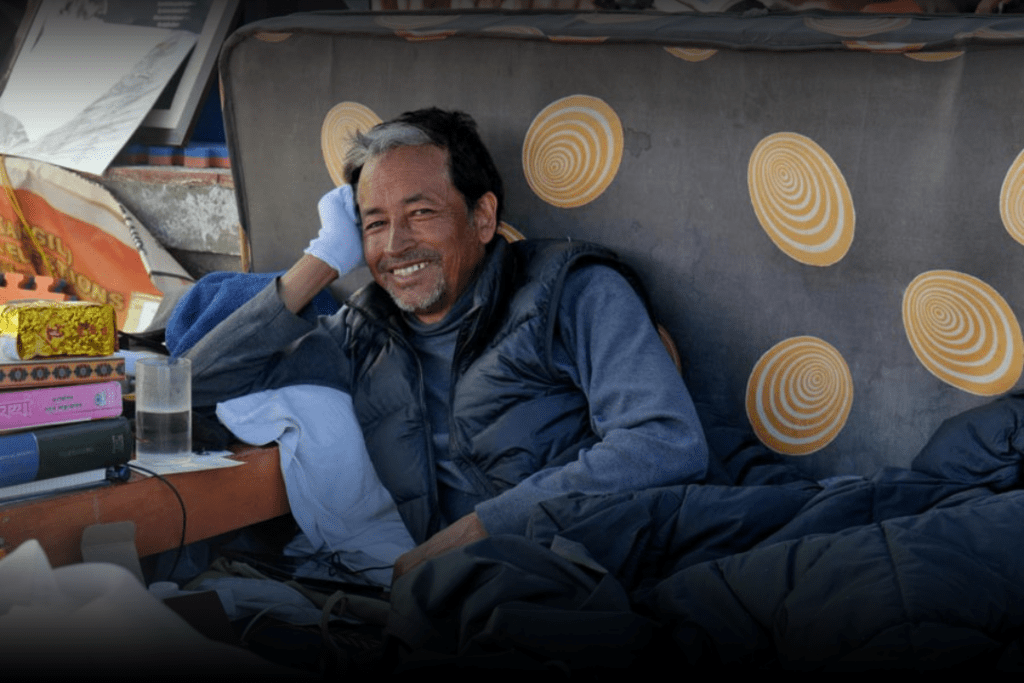
PROTEST
On 6 march, when the discussions with the government did not yield any result, the famous educator, innovator and activist ‘’Sonam Wangchuk’’ decided to go on an indefinite fast for 21 day’s. He said, ’’I’m going on an indefinite fast until Ladakh’s voice is hear, until the government pays attention to Ladakh. To support Sonam Wangchuk more thousands people gathered in Ladakh to protest. Everyone was gathered at one place to protest for their rights.
These protest are being organized under the ‘’Leh Chalo’’ campaign by the Leh Apex Body (LAB) and Kargil Democratic Alliance (KDA).
In January 2023, a protest occurred at the Himalayan Institute of Alternative Ladakh amidst -20 degree Celsius temperatures. The following month, in February 2023, another protest took place at Jantar Mantar in Delhi. Sonam Wangchuk had initially intended to protest at Khardung La Pass, where temperatures plummet to -40 degree Celsius. However, this plan was thwarted as the central government placed Sonam Wangchuk under house arrest.
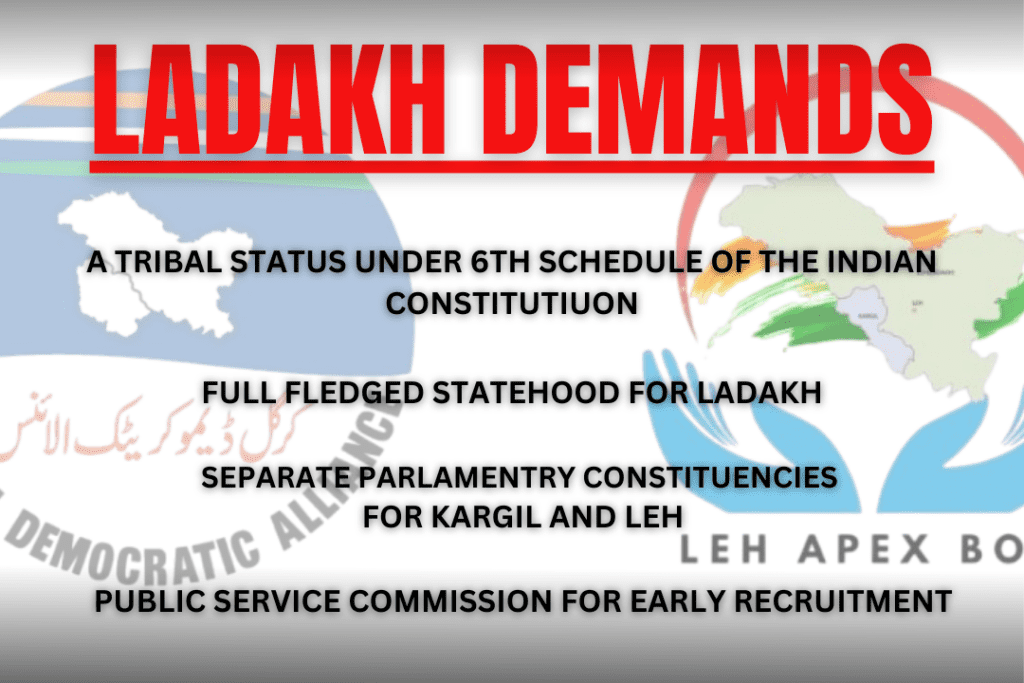
DEMANDS
Leaders in Ladakh are advocating four key demands.
- Full – Fledged statehood for Ladakh.
- A tribal status under the sixth schedule of the Indian constitution.
- Separate parliamentary constituencies for Kargil and Leh.
- Public service commission for early recruitment
Full – Fledged statehood for Ladakh
After the removal of 370 . J&K and Ladakh were divided into 2 separate union territories. J&K with a legislature and Ladakh without a legislature. J&K can from it’s own government and can have a chief minister because this union territory has it’s legislature. But Ladakh won’t have any legislature, it won’t have any government or chief minister but it will be under the direct control of the Central Government through the lieutenant governor. If Ladakh has their own local government then in the interest of the locals they make laws and policies according to the culture. But people in Ladakh are afraid that if the Central Government make direct laws then they won’t be able to make laws and policies according to their culture.
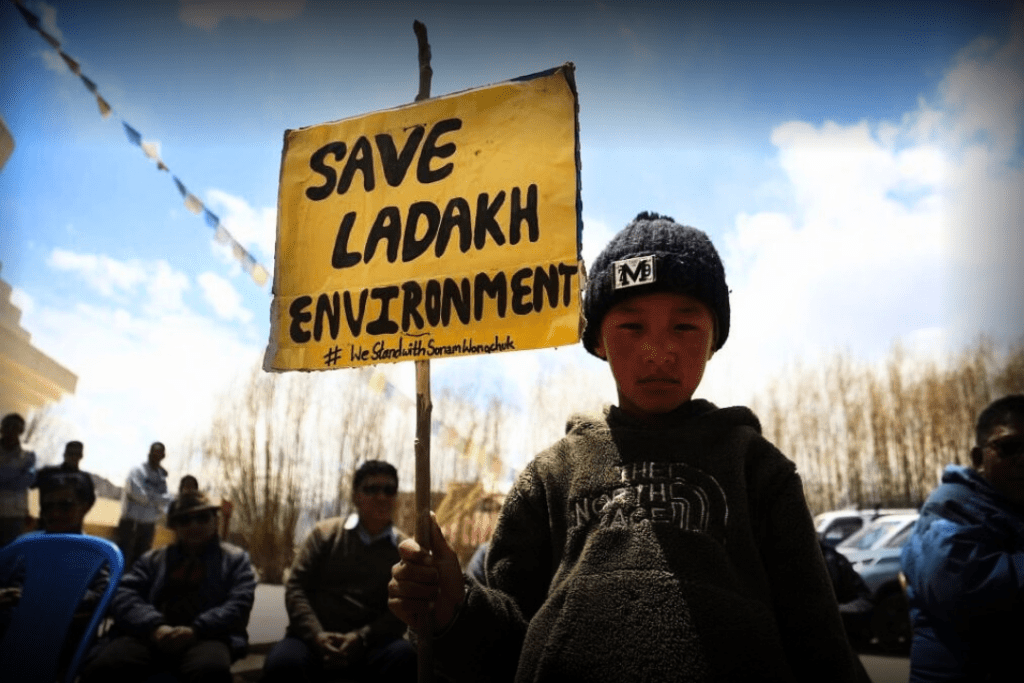
A tribal status under the sixth schedule of the Indian constitution
The provisions of the 6th Schedule in the Indian Constitution can be found in Articles 244(2) and 275(1). The Sixth Schedule of the Indian Constitution contains rules relating to the governance of tribal areas. According to the 6th Schedule, tribal communities in specified areas have the right to establish their own Autonomous District Councils (ADCs) and Autonomous Area Councils (ARCs) to enhance democratic practices within their communities. In 1949, the Constituent Assembly approved the Sixth Schedule, which provided a certain level of self-governance to the tribal areas in the north-eastern region. They are basically elected bodies that have the power to administer tribal areas. So that on a local level, the tribal people can make their rules about their land, forest and socio-cultural customs. So that people from outside can’t exploit their land and resources. Today, this 6th schedule is applicable in the tribal areas of Assam, Meghalaya, Tripura and Mizoram. It is a well-known fact that Ladakh is devoid of forests, but it is important to note that each specific region within Ladakh exhibits its own unique natural biodiversity. The Sonam Wangchuk has explained this many time that the area of Ladakh is very vulnerable, considering climate change.
If the resources are allowed to be exploited in this area , it will be largely dangerous for Ladakh. The frequency of natural disasters, flash flood and landslides will increase. The majority population of Ladakh falls in the scheduled tribes category. According to NCST, the scheduled tribe population represent 66.8% in Leh, 73.35% in Nubra, 97.05% in Khalsti, 83.49% in Kargil, 89.96% in Sanku and 99.16% in Zanskar areas of the Ladakh region. The 6th schedule will give the people of Ladakh their democratic right. Environmental activists are highlighting the potential threats posed by mining and industrial activities to Ladakh’s delicate glacial ecosystem. The objective of achieving Sixth Schedule status is to preserve the unique high altitude deserts, glaciers and alpine meadows that support a variety of rare and endangered species.
Separate parliamentary constituencies for Kargil and Leh
Their final demand was to give Ladakh two constituencies for the Lok Sabha. One from Leh and one form Kargil .
Public Service Commission
Every state has it’s own public service commission through which many government officials are selected. Like that Ladakhi people want a separate public service commission in Ladakh where jobs are reserved for them. Ladakh’s demand was that only Ladakhi’s will get jobs from this commission. For example, in 2020, from The National Health Mission 110 doctors went to Ladakh from Gujarat, Rajasthan, Tamil Nadu, Andhra Pradesh and UP who were getting RS. 2.5 lakh per month. Ladakh’s leaders said that if they get a commission then Ladakh is will get such jobs.
A High-Powered Committee
In January 2023, a high-powered committee was established by The Home Ministry, led by Union Minister of State for Home, Nityanand Rai. However, both KDA and LAB expressed their refusal to engage with this committee as their focus does not include the 6th schedule or statehood. Consequently, it became evident that the government could discuss employment opportunities with the people of Ladakh, but not the 6th schedule or statehood matters.
Six months later, the government extended another invitation to the leaders of Ladakh. This time, both KDA and LAB expressed their willingness to engage in discussions with an open mind. Sajjad Kargili, a member of KDA, emphasized the importance of dialogue in achieving their objectives and expressed hope that the government would listen attentively.
Government statement
Following the discussions, the Union Home Ministry issued a statement emphasizing the need for their high-powered committee to address matters like culture, language, and other subjects. However, this statement did not make any reference to the 6th schedule or statehood. Chering Dorje Lak rook, a former minister in Kashmir’s PDP-BJP government, revealed that during his meeting with Amit Shah, he was informed that neither statehood nor a guarantee for the 6th schedule could be provided, resulting in the failure of their negotiations.
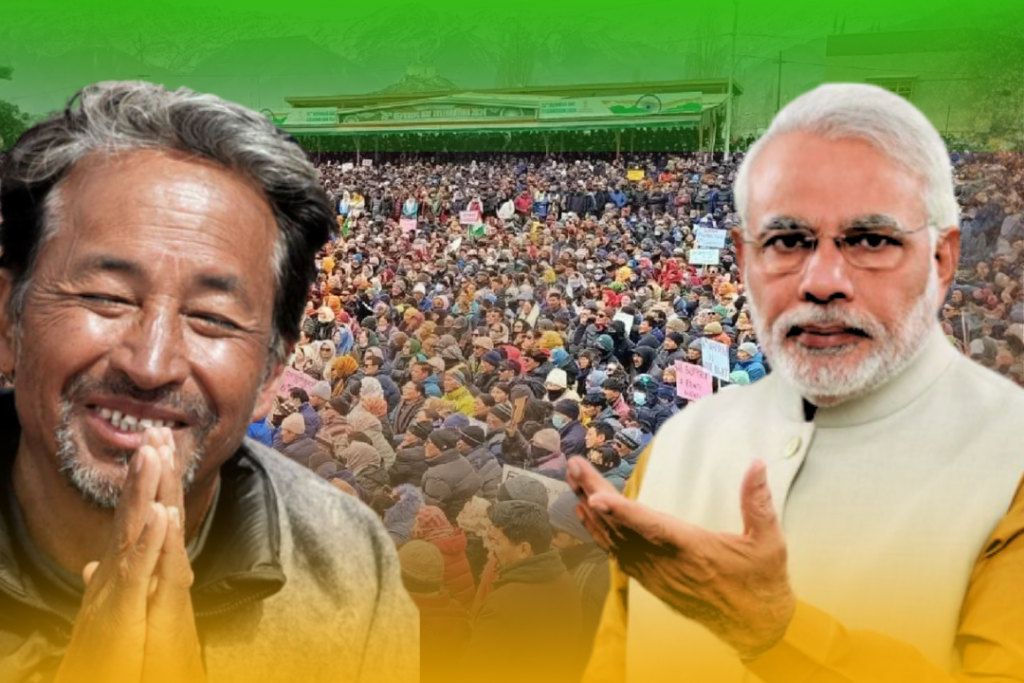
Why government is Backtracking His Promises?
So publicly, our government says that people of Ladakh need more development and we are doing the same thing. We have increased the budget of Ladakh which is why road network, hydroelectric power plants and many other things are being built. The Ministry of Home Affairs said that it is not easy to bring Ladakh under the 6th schedule because this schedule was only written for the North Asian states. Now the constitution can be changed and Ladakh can be included in it but the government says that it is not that easy. To do this, we need some majority in parliament and there are many complications.
But many experts say that the actual reason are different. The central government fears that Ladakh’s 6th schedule autonomy could impact it’ military project such as these projects are The road network, tunnel system, airstrip, surveillance posts and security infrastructure. The government fears that such military projects may not be approved due to environment reasons and if Ladakh is given the 6th schedule, the industry won’t come in Ladakh. The government is afraid that after giving 6th schedule, it will became a precedent such demands will come from other parts of country as well like from West Bengal Nepali- Speaking Gorkha people who live in the Darjeeling and Kalimpang districts have been demanding political autonomy and statehood from a long time.

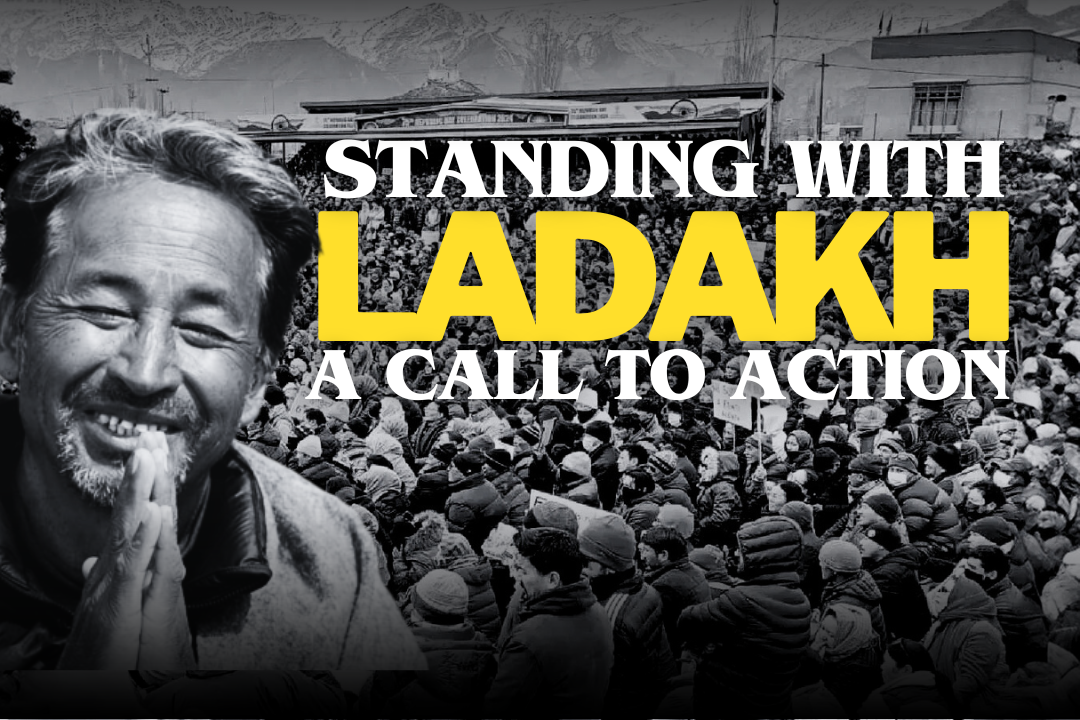

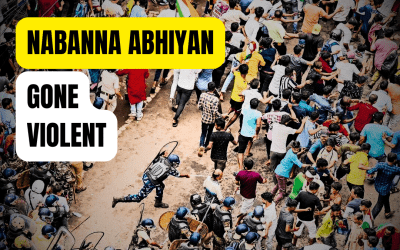
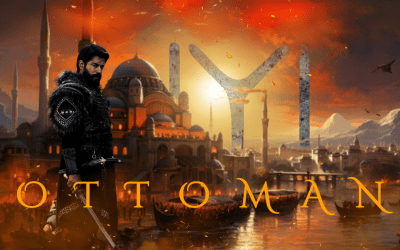
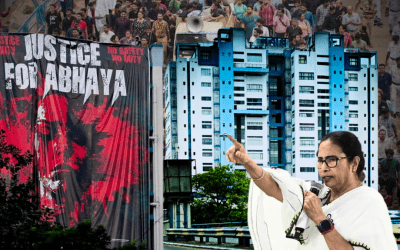
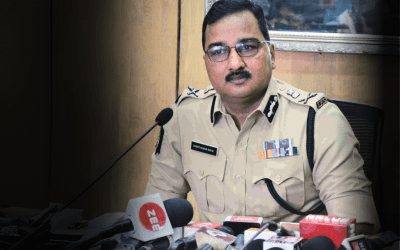

0 Comments